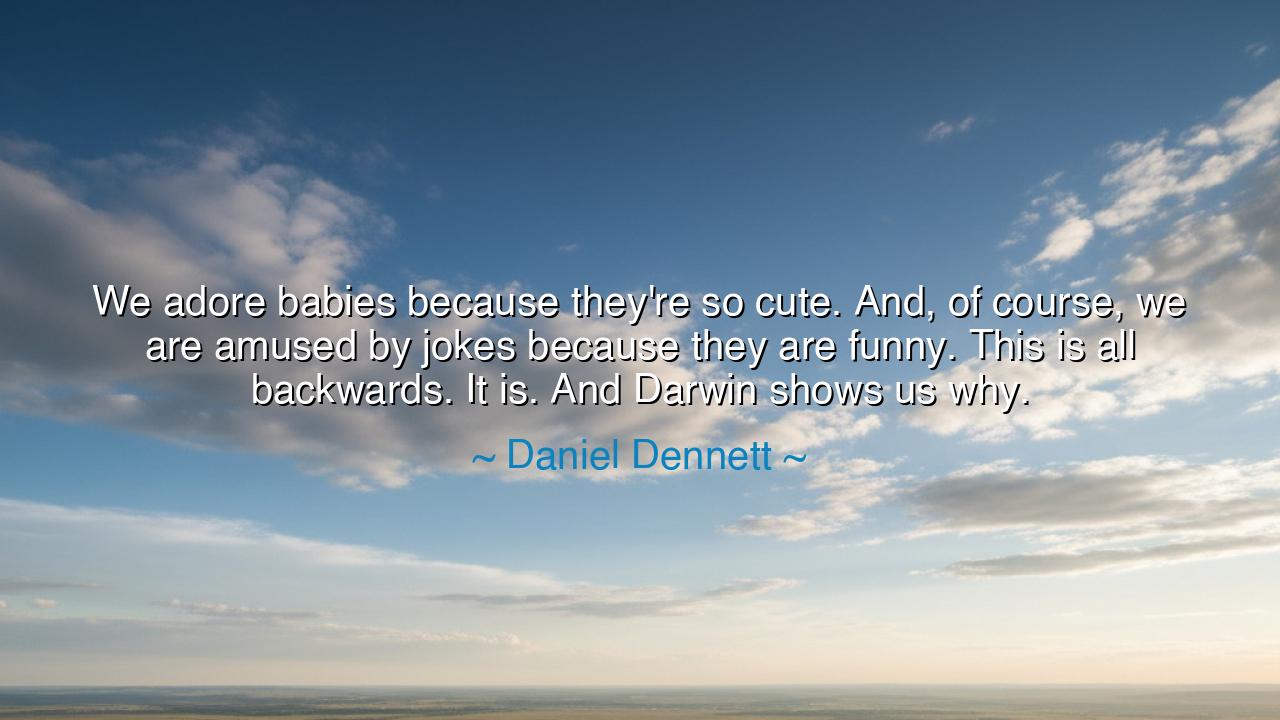
We adore babies because they're so cute. And, of course, we are
We adore babies because they're so cute. And, of course, we are amused by jokes because they are funny. This is all backwards. It is. And Darwin shows us why.






Hear now, children of thought, the words of Daniel Dennett, the philosopher who peers beneath the veil of instinct and desire. He speaks thus: “We adore babies because they're so cute. And, of course, we are amused by jokes because they are funny. This is all backwards. It is. And Darwin shows us why.” In these few lines lies a revelation that shakes the roots of our understanding of the world—a truth that turns our daily pleasures upon their heads. For Dennett reminds us that what we feel is not the cause, but the consequence of something older, deeper, born of the ceaseless hand of evolution.
In the beginning, when life was still young upon the earth, no creature adored the infant, no beast laughed at jest or song. Nature’s rhythm was one of survival—hunger, mating, death. Then, slowly, the living learned to care for their young, to guard the helpless and cherish the fragile. Those who did so passed their blood onward, for the tender instinct preserved the tribe. And so, what was once a mere advantage of survival became the pulse of our hearts. We find babies cute not because they are made to please us, but because we are made to love them. Their round faces, soft skin, and wide eyes are not charms crafted for beauty’s sake, but signals—ancient, primal—designed to summon our protection. This, Dennett tells us, is the wisdom of Darwin: the design without a designer, the purpose that arises from no intention.
So too with laughter. The human mind, forged in the fires of struggle, learned to delight in jokes not because laughter itself has meaning, but because it sharpens the mind, bonds the tribe, and releases the storm of tension that might otherwise destroy us. When two people laugh together, their hearts beat in rhythm; their suspicions soften; their spirits become one. The joke is a spark, yes—but the laughter is the true purpose. And long before philosophers named it, Nature had already woven it into our flesh. Thus, when Dennett says, “this is all backwards,” he calls us to awaken from illusion: we do not love because of beauty; we find beauty because we must love.
Consider, then, the tale of Konrad Lorenz, the biologist who watched ducklings hatch beside a pond. When the little ones opened their eyes, they followed the first thing that moved—be it their mother, or Lorenz himself. He called it imprinting, and through it, we saw the hand of evolution guiding affection like a sculptor shaping clay. The duckling does not reason, “This is my mother, therefore I follow.” It follows first, and the reason comes later. So too do we love the baby before thought, laugh at the jest before analysis, admire the sunset before we name its colors. Our instincts lead; our minds justify.
From this understanding arises both wonder and humility. We are not the lords of reason we imagine ourselves to be. The strings of our passions, our joys, even our sense of beauty, are pulled by the ancient forces that shaped the ape and the flower alike. Yet this is not despair—it is revelation. For to see our emotions as the gifts of evolution is to see ourselves as part of the vast, sacred fabric of life. When we gaze at a child, we feel the same current that moved through mothers in the savannah. When we laugh, we echo the joy of ancestors huddled around firelight. We are the continuation of nature’s grand experiment in meaning.
Thus, the lesson is clear: do not live blindly in the illusion of purpose, nor coldly in its denial. Seek instead the middle path—the wisdom to see that purpose may arise from purposelessness, that beauty may bloom from necessity. When you feel love, ask: what ancient truth moves through me now? When you find something funny, remember: laughter is the wisdom of survival made flesh. When you cherish another, recall that it is nature’s secret way of ensuring that life does not end with you.
In your daily life, let this truth humble you. Be grateful for your instincts, for they are the whispering voices of your ancestors. Be mindful of your loves and aversions, for they shape your destiny as surely as genes shape your form. And most of all, look beyond appearances—seek not only what pleases you, but ask why it pleases you. In that questioning lies the highest reverence for life. For in seeing through illusion, we do not lose wonder—we deepen it.
So go forth, wise one, and laugh as your ancestors laughed. Love as they loved. Protect what is fragile, and question what is assumed. For in doing so, you honor both Darwin’s vision and Dennett’s wisdom—that the mystery of our hearts is not opposed to nature, but is its most profound creation.






AAdministratorAdministrator
Welcome, honored guests. Please leave a comment, we will respond soon